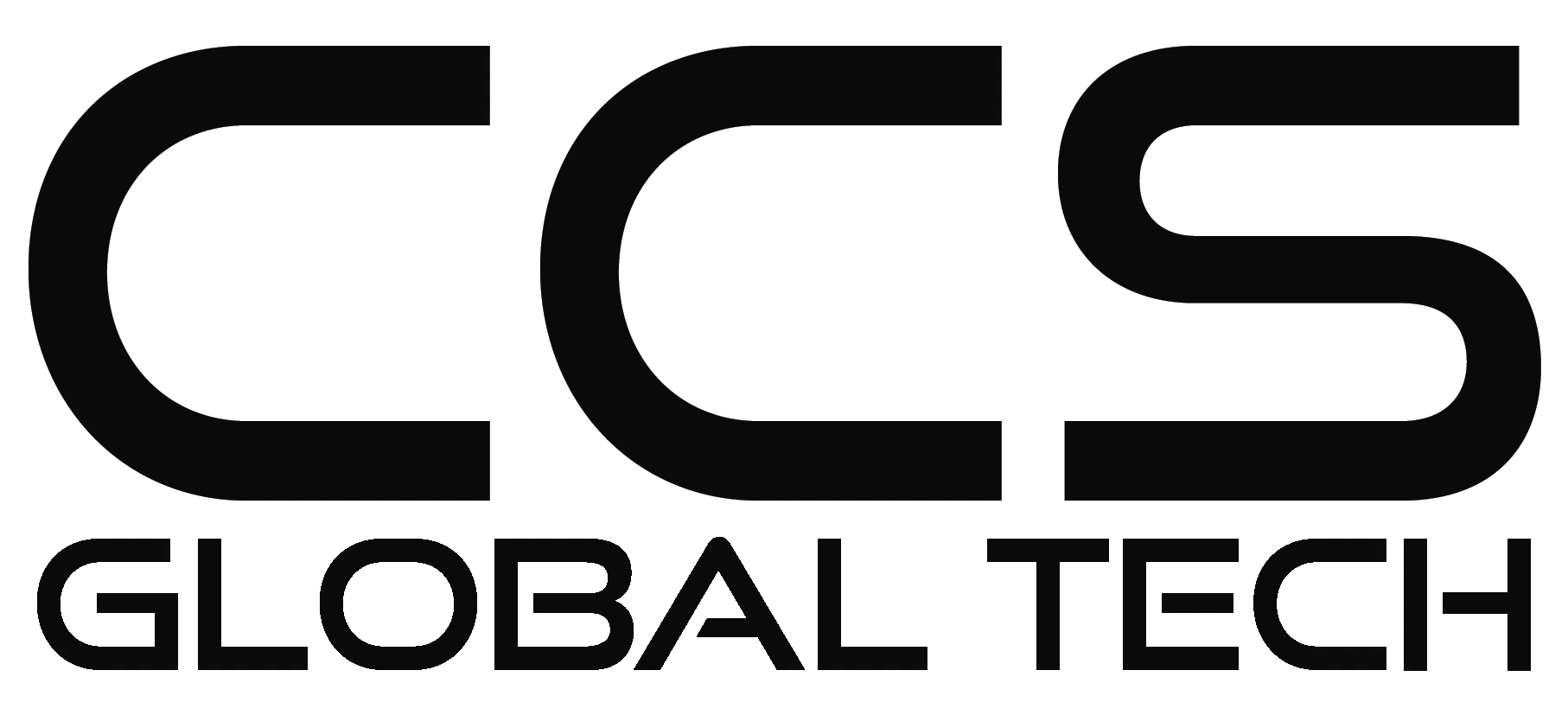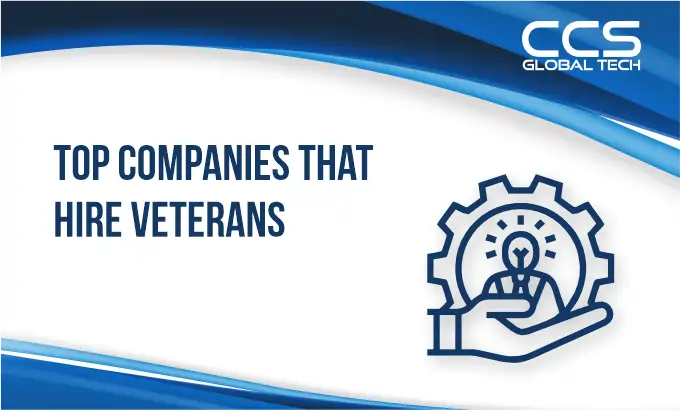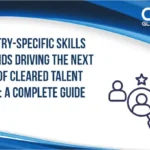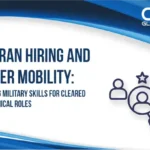Nearly 200,000 service members transition to civilian life each year, and most organizations are doing veteran hiring completely wrong.
Here’s the uncomfortable reality: While veteran unemployment has dropped to 2.8%, underemployment remains a massive challenge. We’re watching highly capable military professionals take positions far below their skill level because civilian employers don’t know how to evaluate military experience.
The irony is staggering: Organizations desperately need leadership, technical expertise, and proven performance under pressure – exactly what veterans bring, but they’re systematically undervaluing this talent because they can’t translate military capabilities into business impact.
Meanwhile, the organizations that have figured out veteran hiring aren’t just filling positions. They’re building competitive advantages that their peers can’t replicate.
The data tells the story: Veterans are 39% more likely to be promoted into leadership within three years and demonstrate higher retention rates with their first civilian employer. Yet most companies are still treating veteran hiring as a compliance initiative rather than a strategic opportunity.
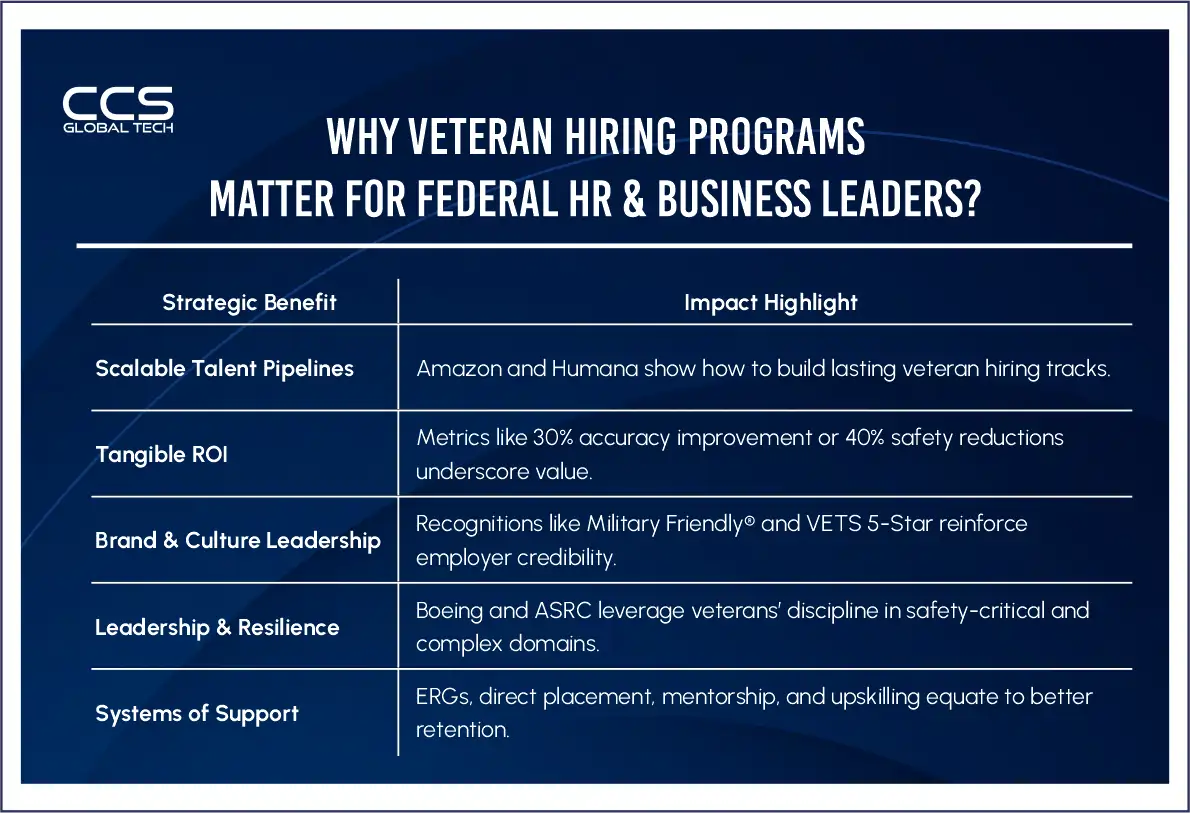
Why Most Veteran Hiring Programs Fail?
Before we examine what works, let’s address what doesn’t. Most veteran hiring programs fail because they approach military talent as a charity case rather than a competitive advantage.
The typical approach: Post job openings with “veteran-friendly” labels, offer basic resume translation workshops, and hope veterans will adapt to civilian workplace culture.
The problem with this strategy: It assumes veterans need to be “fixed” rather than recognizing that military experience often exceeds civilian job requirements. Organizations using this approach are getting candidates who’ve been trained to downplay their capabilities rather than showcase them.
The winning approach: Recognize that veterans bring capabilities most civilian candidates don’t possess, then build roles and pathways that leverage these advantages.
Organizations That Understand Veteran Value
Amazon: Scale Meets Strategy
Amazon pledged to hire 100,000 U.S. veterans and military spouses by 2024 and surpassed that goal by early 2024. Today, over 45,000 veterans and military spouses work across roles from operations to AWS and Alexa.
What makes their approach work: Every veteran interview includes a fellow veteran, and affinity programs like Warriors at Amazon (with 600+ chapters globally) plus mentorship networks support integration. They’re not just hiring veterans – they’re building veteran communities within the organization.
Cushman & Wakefield: Structured Transition Excellence
This commercial real estate leader has hired more than 1,400 veterans through its Military & Veteran Program (MVP), combining 12-week onsite training with mentorship and skill translation. In 2024, it ranked 5th among Military Friendly® Top Employers and earned the 5-Star VETS Indexes Employer designation.
Strategic insight: Their MVP team advises 100+ other organizations on veteran inclusion strategies, positioning veteran hiring as a core competency rather than a side program.
ASRC Federal: Defense Contractor Integration
As one of the top military-friendly federal contractors, ASRC Federal offers structured environments for veterans, including its MilComm Employee Resource Group and dedicated career pathways. This reflects commitment beyond recruitment toward retention, mentorship, and community building.
Textron Aviation: Industry-Specific Excellence
Named a Top 25 Veteran Employer of 2025, Textron integrates veterans into aviation careers with nearly 15% of its workforce composed of veterans. They offer training pathways like SkillBridge internships and A&P certification while providing tools to translate military skills into civilian aviation roles.
JPMorgan Chase: Financial Services Leadership
As part of the Veteran Jobs Mission, JPMorgan Chase pledged to hire C veterans and has exceeded 11,000 veteran hires over the past five years. Their strategic commitments, backed by infrastructure and partnerships, demonstrate how scale, credibility, and mission alignment drive impact.
Boeing Defence Australia: Mission-Critical Integration
This firm employs more than 1,000 veterans, over 22% of its workforce. Their Veterans Engagement Team ensures safety-critical veterans thrive in aviation environments where military precision and discipline directly drive performance outcomes.
The Strategic Frameworks That Actually Work
Skills-First Evaluation
The most successful veteran hiring programs evaluate capabilities rather than credentials. Military experience often provides more practical, hands-on expertise than traditional academic or civilian training programs.
Example: Military communications specialists have maintained connectivity in hostile environments where downtime wasn’t an option, experience that exceeds most civilian network administration requirements.
Community Integration, Not Individual Assimilation
Organizations like Amazon and ASRC Federal build veteran communities within their companies rather than expecting individual veterans to adapt to existing cultures. This approach leverages the collaborative and mission-focused culture veterans bring.
Leadership Track Recognition
Companies like Textron and Boeing recognize that many veterans have leadership experience that civilian candidates at similar levels lack. They create pathways that acknowledge and utilize this leadership capability rather than requiring veterans to “start over.”
Mission Alignment
Veterans are motivated by purpose and mission impact. Organizations that clearly articulate how roles contribute to meaningful outcomes, whether national security, public safety, or community benefit – attract and retain veteran talent more effectively.
The Retention Factor Everyone Misses
Here’s something most organizations don’t understand about veteran hiring: Retention isn’t about benefits packages, it’s about belonging and purpose.
Successful veteran hiring programs create environments where military experience is valued, not tolerated. This means:
- Peer Networks: Veterans working alongside other veterans who understand their background and capabilities
- Mission Focus: Clear connection between daily work and larger organizational purpose
- Growth Pathways: Recognition that many veterans bring leadership experience and advancement potential
- Skills Utilization: Roles that actually leverage military training rather than requiring veterans to learn entirely new capabilities
The Competitive Advantage Most Organizations Miss
While other companies compete for civilian talent with traditional requirements, organizations excelling at veteran hiring access a talent pool with unique advantages:
- Proven Performance Under Pressure: Veterans have demonstrated capability in high-stakes environments where failure had serious consequences.
- Leadership Experience: Many veterans have managed teams, resources, and complex projects at younger ages than their civilian counterparts.
- Security Clearance Capability: Veterans often hold or qualify for security clearances that civilian candidates need months or years to obtain.
- Adaptability and Learning: Military training emphasizes continuous learning and adaptation to new situations and technologies.
- Team Collaboration: Military culture emphasizes mission success over individual achievement, creating strong team dynamics.
Building Effective Veteran Integration Programs
Make Meaningful Commitments
Adopt specific hiring goals with transparent progress tracking. Half-hearted efforts produce half-hearted results. Organizations succeeding with veteran hiring make substantial, public commitments.
Invest in Skill Translation and Development
Provide pathways that help veterans demonstrate their capabilities in civilian contexts, internships, certification programs, mentorship, rather than expecting them to figure it out independently.
Create Veteran Communities
Employee Resource Groups (ERGs) like Warriors at Amazon or MilComm at ASRC help veterans feel connected and valued, not just hired. These communities become retention and recruitment tools.
Measure Business Impact
Track retention rates, performance metrics, leadership advancement, and cultural impact to demonstrate return on investment and build support for continued veteran hiring initiatives.
Partner with Veteran Organizations
Collaborate with Military Friendly®, VETS Indexes, and veteran transition organizations to access broader talent networks and enhance program credibility.
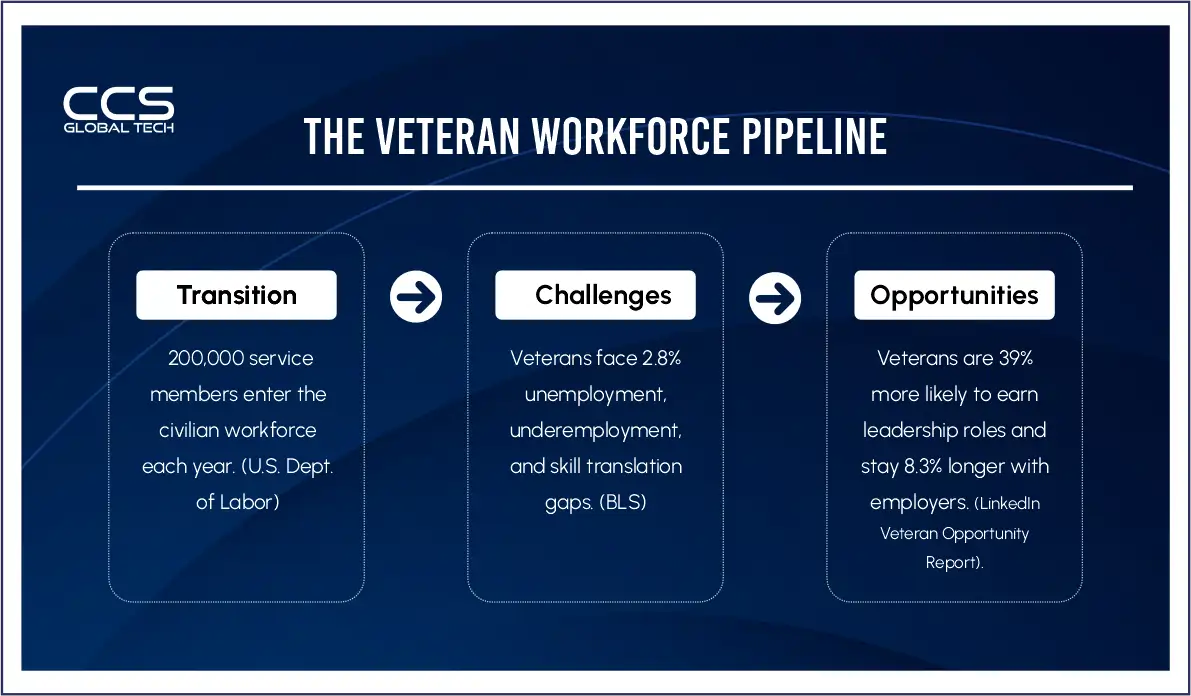
The Market Reality for Cleared Veteran Talent
For organizations requiring security clearances, veteran hiring becomes even more strategically critical. Veterans with active clearances represent immediate capability deployment without the 12-18 month clearance processing delays that civilian candidates require.
The supply-demand imbalance: While overall veteran talent is abundant, veterans with active security clearances and specialized technical skills represent a much smaller, highly sought-after population.
Strategic implications: Organizations that build relationships with cleared veteran talent before immediate hiring needs arise gain significant competitive advantages in federal and defense contracting markets.
Looking Forward: The Strategic Imperative
Veteran hiring in 2025 isn’t about corporate social responsibility, it’s about competitive advantage in talent markets where leadership, technical capability, and proven performance are increasingly rare.
The organizations profiled here understand that veterans aren’t candidates who need accommodation – they’re professionals who bring capabilities most civilian candidates lack. Their success comes from building systems that recognize, develop, and retain this talent rather than trying to change it.
The bottom line: Veteran talent is one of America’s most underutilized resources. Organizations that integrate it effectively gain lasting advantages in leadership, performance, and mission success.
CCS Global Tech bridges the gap with a vetted pool of cleared talent, veterans with TS/SCI, Polygraph, and Public Trust, ready for federal and high-security roles. We connect agencies and contractors with the right people at the right time to ensure compliance and mission success.
Ready to strengthen your team with cleared veteran talent?
FAQs
Q1-Why do companies specifically seek to hire veterans?
A: Veterans bring valuable skills such as leadership, discipline, teamwork, and adaptability, which are highly desirable in the civilian workforce. Many companies value the unique experiences veterans bring from military service.
Q2 – What types of jobs are typically available for veterans at these companies?
A: Veterans are hired across a wide range of roles, including operations, logistics, IT, cybersecurity, project management, engineering, and human resources, among others.
Q3 – Are there any companies that have veteran hiring programs or initiatives?
A: Yes. Companies like Amazon, Lockheed Martin, Booz Allen Hamilton, and Verizon have dedicated veteran hiring programs and offer transition assistance, mentorship, and training.
Q4 – Do these companies offer support during the military-to-civilian transition?
A:Many top veteran-friendly employers provide onboarding support, mentorship programs, and resources to help veterans transition smoothly into civilian roles.
Q5 – How can I find out if a company is veteran-friendly?
A: Check the company’s website for veteran hiring initiatives, partnerships with veteran organizations (like Hiring Our Heroes), or recognition from sources like Military Times or VIQTORY’s Military Friendly® Employers list.
Q6-Do I need a college degree to be hired by these companies?
A: Not always. While some roles require degrees, many companies value military experience and provide training programs or certifications for roles that don’t require a formal degree.
Q7-Are there remote or flexible work opportunities for veterans?
A: Yes, several companies offer remote, hybrid, or flexible work options, especially in roles like IT, cybersecurity, customer support, and project management.
Q8-What should I include on my resume when applying as a veteran?
A: Translate military skills into civilian terms, highlight leadership, problem-solving, and technical skills, and include any relevant certifications or security clearances.
Q9 – Are there resources to help me prepare for interviews with these companies?
A: Yes. Organizations like Hire Heroes USA, American Corporate Partners (ACP), and the Department of Veterans Affairs (VA) offer free job prep, resume reviews, and interview coaching.
Q10-What are some of the top companies known for hiring veterans?
A:
Some of the top veteran-friendly employers include Amazon, Boeing, Lockheed Martin, USAA, Raytheon Technologies, Verizon, Deloitte, and Walmart.
